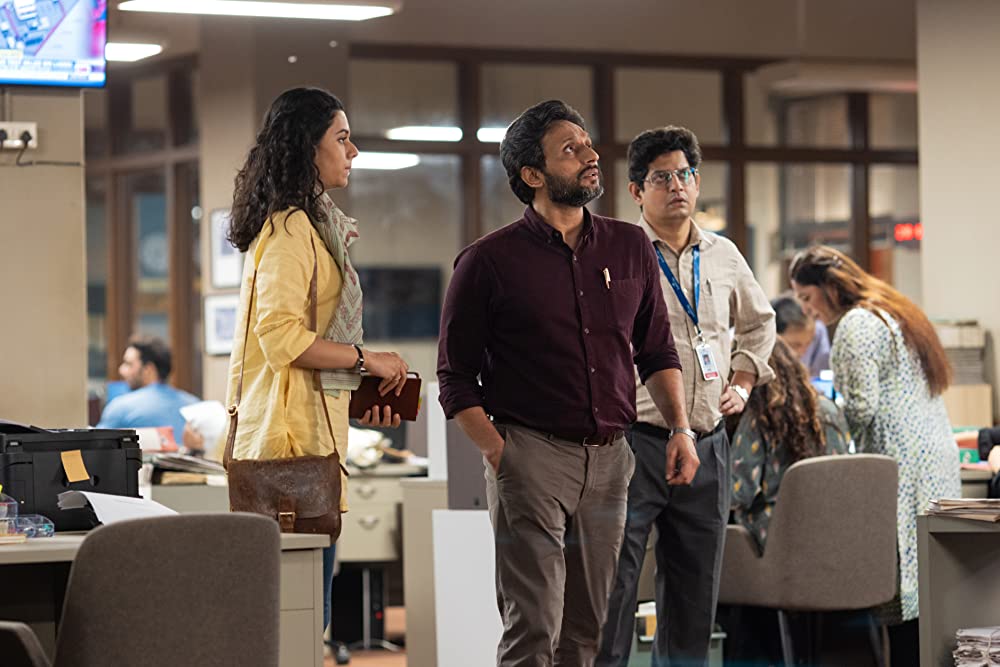I follow a common rule of thumb when completely engrossed in a long-form narrative. The time it takes me to recall or dissect plot moments as flaws after I have finished watching the series tells me how much I appreciate or like the show. The longer it takes me to recognize those flaws, or “critiques,” if you will, the better my appreciation for the show overall. Because that would imply that the show has succeeded in keeping me involved in the story and relishing its aftertaste long after the credits have rolled. Hansal Mehta’s series Scoop (Season 1) falls on the positive side of this appreciation scale.
Based on the book “Behind Bars in Byculla: My Days in Prison” by Jigna Vora, Mehta’s story follows Vora’s analog, Jagruti Pathak (Karishma Tanna), an ace crime reporter and deputy chief of the newspaper “Eastern Age.” She is determined, fearless, and not afraid to maintain a relationship between the cops and criminals, even if that means rejecting advances from the head of the EOW, Inspector Shroff (Harman Baweja), or sharing a meal with one of the numerous young underlings of Chota Rajan. It all is for the story, for that elusive page one byline, with the caveat that all her information has been confirmed and covered by additional sources.
She has the approval of her boss Imran (Mohd. Zeeshan Ayyub), the Editor of Eastern Age. She is the woman her protege aspires to be. Pathak’s only competition seems to be Jaideb Sen (Prosenjit Chatterjee), the crime reporter of a rival news agency who is a living legend and a scourge of the underworld, who has ears everywhere and is hellbent on proving a conspiracy about the existence of a nexus between the Mumbai Police and the Underworld, with the administration involved in both sides of the gang war between Dawood Ibrahim and Chota Rajan.
The break in the story occurs when Pathak manages to get an exclusive interview with Chota Rajan via phone call, and while that shoots her up the stratosphere amidst her circles, it ruffles enough feathers. Armed goons under orders shot Jaideb Sen in broad daylight. Pathak was fingered for conspiracy to murder by Chota Rajan in a conversation with his underling that the Mumbai Police coincidentally recorded.
Hansal Mehta’s success in delivering true stories in an engaging narrative format rests in knowing how to deliver that true story through the relevant lens while sprinkling in free narrative license whenever possible to spice the story up. “Scoop” is firing on all cylinders when the story focuses on Pathak, Imran, and the other reporters of Eastern Age trying to navigate the murky underwater of the Bombay Underworld in mid-2011, a time when it was believed that the hold of the two figureheads in the Underworld had been waning.
What Mehta is very successful at is delivering all of the events that had occurred, leading up to Pathak’s call with Rajan and her arrest after Sen’s murder, as a thriller, complete with sharp edits, fast-paced storytelling, intense music, and yet a sense of objectivity that has now become a staple of Mehta ever since “Omerta.”
There isn’t any showy camerawork, as Mehta is more interested in efficiently delivering a story. But as soon as the story shifts to Pathak being sent off to Byculla Prison for judicial custody until she is granted bail or found not guilty, the storytelling somewhat slackens. The genre shifts—now becoming a prison drama and a courtroom drama as well.
The flaws become more and more readily apparent as the show starts delving deeper into prison drama tropes. While plot threads have become tropes for a reason since the longevity of these tropes results in easier storytelling. As a result, it is the hammering home of the depressive nature of the women’s prison that tends to become exhausting.

Pathak has to navigate harsh and cruel wardens, the true chief of the prison, who is coincidentally one of those criminals who had been prosecuted due to reports that she had broken, and since the prison is a new and unfamiliar playground, Pathak is at the mercy of brutal and gross tortures as forms of revenge. Meanwhile, Mehta shows the court case with the forensic reports and the chargesheet filing getting conveniently delayed, and the crucible Pathak undergoes becomes darker and darker.
Thankfully, Mehta doesn’t drag it out for too long, with the prison sequences broken by intertitles marking that time has passed or shifting the narrative to the journalism plot or the family drama, which, while not explored as much as expected, is still effective enough because of the acting done by all the thespians involved.
A genuine jarring feeling occurs when Mehta almost cavorts into melodrama in the prison sequences, and then there are the subplots. The subplots of Pathak’s protege lose her way as she tries to climb up the ranks, and Pathak’s colleague Pushkar eyeing the post of editor-in-chief are introduced to highlight the different facets of journalism and how much corruption and overly ambitious tendencies can blind a person from uncovering one of the pertinent features of journalism: emphasizing the difference between the truth and a story.
Pushkar’s subplot of him trying to climb up the corporate ladder as well as replace Pathak’s goodwill in the office is well contrasted with his personal life, where his wife is working as the second-in-command to a politician and getting harassed by all her male colleagues, with rumors being thrown about her unsavory methods to reach this post.
The irony is that Pushkar is advising his wife to tough it out and reminding her that those guys are jealous, completely unaware of his folly, and lacking the empathy to realize Pathak’s resilience as a result of having faced all this for the past 7.5 years of her career. The problem with this story thread is that it reads well on paper, but on screen, it becomes ancillary the longer the story focuses on the hardships faced by Pathak. It only manages to bloat the runtime.
At six episodes, each an hour in length, Mehta crams a lot of story into these six hours, but the efficiency of the storytelling, especially in the first three episodes, should be applauded. The cast also heavily bolstered the show, especially Karishma Tanna as Jagruti Pathak. Long known to play feisty characters in soap operas, Tanna is finally given a multifaceted role in a web series that she can make her own, and she knocks it out of the park.
We are always ready to follow and root for her. While her character isn’t slippery or complex, the conflict stems from the external circumstances trying to break her down and her resilience to hold on. Harman Baweja, as the head of EOW, has come a long way from the leading hero image he started with. His role requires him to play smarmy and frustrated, and Baweja is decent in the role. Still, the writing fails him, with his cancer coming back with a vengeance and completely affecting him before he springs the trap against Pathak and twists it further, which is just symbolism with the subtlety of a sledgehammer.
Conversely, the convolution of the story and the exploration of the connection between the authorities and the Mumbai Underworld is offset by the realistic worldbuilding that Mehta successfully does, thanks in no small part to the strong and reliable supporting cast. Prosenjit Chatterjee, as Jaideb Sen, has a small role but leaves an impact as the victim of a violent crime, which becomes an inciting incident for scapegoating a strong, independent, fearless reporter.
Through that, Mehta again manages to deliver the underlying message, which is powerful enough to overwhelm and transition from subtext to text. If looking at a macro level, Scoop stands out as one of the few projects dealing with journalism that manages to show the profession in a comparatively more positive light than recent efforts.
When sticking with that profession, “Scoop” becomes compelling fodder for entertainment. When becoming a prison drama, however, it almost threatens to overstay its welcome, with an addition to the cast in the penultimate episode feeling like a narrative crutch to ease the storytelling and make it move through particular beats it needs to hit.
Thankfully, Scoop doesn’t overstay its welcome and, even in one moment, manages to become a commentary for Mehta’s earlier acclaimed miniseries “Scam 1992”, with regards to idolizing or glorifying dishonest men because of their hustle culture and gaming the system. It is fascinating that Mehta is doubling down on the message of his earlier works and interweaving them here, but it does work pretty seamlessly.









